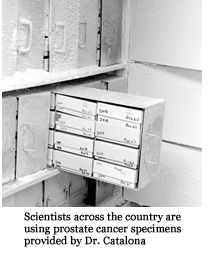URF Participating in New Method of Drug Discovery
“Medicines will be based on genetic composition of patients.”
William J. Catalona, MD
 At a recent board meeting of the Urological Research Foundation, Dr. Catalona told members that he is actively participating in new work which can greatly affect the detection and treatment of prostate cancer.
At a recent board meeting of the Urological Research Foundation, Dr. Catalona told members that he is actively participating in new work which can greatly affect the detection and treatment of prostate cancer.
Up until now, many standard treatments for cancer, such as radiation and chemotherapy, kill some normal cells, as well as cancerous ones, and have dire effects on patients’ other bodily functions.
The new approach would, for the most part, “target” the events in the body which promote or allow the development of cancer cells without affecting normal cells.
Prostate cancer research supported by the Urological Research Foundation is focused on this new approach.
Research in this area uses the drug Gleevec for a model. Considered a new “miracle bullet,” Gleevec has been effective in the treatment of some forms of leukemia and some stomach cancers. It has not been effective for all cancers because all cancers dont express the altered protein which Gleevec targets.
Tests have shown that Gleevec is not effective for prostate cancer patients, but its strategy, which is called “molecular targeting”, corresponds to the prostate cancer work which Dr. Catalona is doing in collaboration with Dr. Jeffrey Milbrant of Washington University.
The theory is that if specific proteins are made in cancer cells in much higher amounts than in normal cells, then the genes producing those proteins must be “turned on” excessively in the cancer cells.
The plan is to develop new drugs that inhibit these overly abundant proteins and thereby block their adverse effects.
“There will be a whole new pharmacy of medicines based on genetic composition of patients and developed from gene expression,” Dr. Catalona said. “And Gleevec has pointed the way.”
Recently developed technologies allow scientists to identify this over expression and also to observe whether it has been inhibited successfully (see New Technology For New Research in Prostate Cancer Treatments article).
Just a few months ago, Dr. William Catalona, Dr. Jeffrey Milbrandt, and their collaborators used these new technologies to discover a protein, hepsin, which is over expressed in prostate cancer (see Potential for Hope in the Treatment of Prostate Cancer article).











